GFCR UN Ocean Conference Engagement
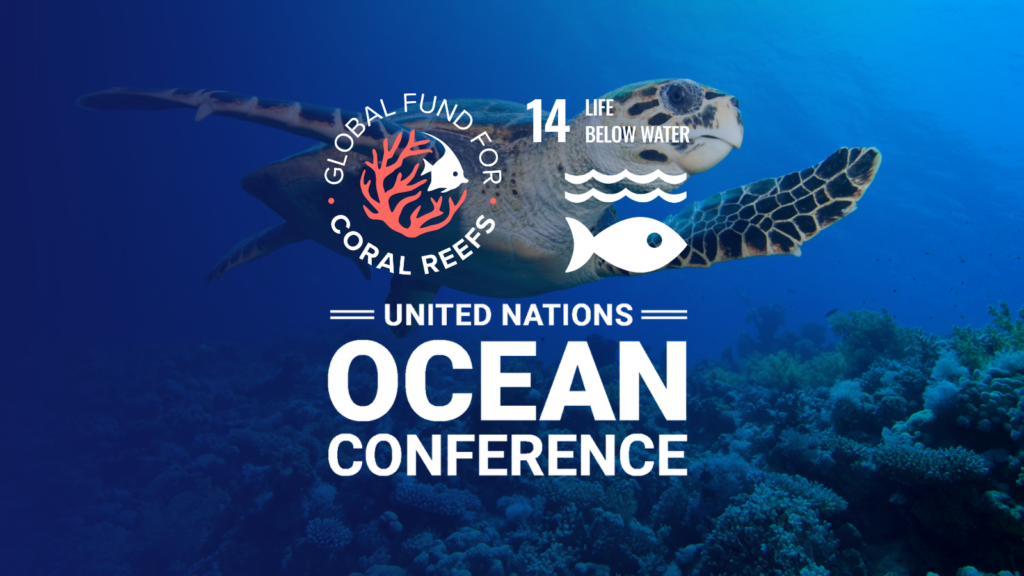
At the 2022 United Nations Ocean Conference (UNOC 2022), the Global Fund for Coral Reefs (GFCR) in partnership with the International Coral Reef Initiative (ICRI) led the convening of global leaders, top scientists, key stakeholders and local champions to accelerate action to save coral reef ecosystems.
In addition to supporting the efforts of the global coral community, throughout the Conference GFCR presented a best-in-class public-private initiative positioned to deliver resources to bridge the ‘coral reef funding gap’ and scale science-based solutions for reef ecosystems with the best chance of surviving climate change. The Conference further marked the first time the GFCR Coalition and Executive Board convened in-person, joining together to deliver action for SDG14.
During the week, GFCR Coalition representatives presented a global portfolio of blended finance programmes designed to scale climate resilience for reef ecosystems and coastal communities. Leading experts demonstrated supported “reef-positive” business models and financial solutions, as well as de-risking mechanisms, structured to unlock private investment and scale impact. The three UN Agencies participating in the GFCR, provided critical leadership, visibility and outreach support throughout the week.
The GFCR hosted and/or featured in a total of seventeen events throughout UNOC with key achievements during including:
- GFCR and ICRI co-hosted the first-ever ‘Reef Action Hub’ alongside UNOC, offering a convening space for coral-focused events, meetings and strategic discussions. The Reef Action Hub held over 30 action-oriented events, gatherings and strategic meetings well-attended by government leaders, UN officials, leading marine scientists, ocean champions, impact investors, and philanthropic representatives. This included:
- GFCR’s first in-person Executive Board meeting, where members convened to focus on the programme pipeline underway for late 2022 and 2023, as well as an in-depth strategic discussion on the future of GFCR.
- GFCR’s Coral Reef-Positive Business Models event, which explored what makes a business “coral reef positive”, with discussion by a panel of innovators working with the Global Fund for Coral Reefs to develop and finance coral reef positive enterprises at a range of scales.
- ICRI’s Plan of Action launch event in the Reef Action Hub, where HSH Prince Albert II of Monaco, HRH Crown Princess Victoria of Sweden, the Executive Secretary of the Convention on Biological Diversity, ambassadors, ministers, and leading experts focused on actions and resilience for coral.
- Two GFCR features during the Sustainable Blue Economy Investment Forum, hosted by the governments of Kenya and Portugal, where:
- Heads of Delegation for Bloomberg Philanthropies and Builders Vision announced their joining of the GFCR Coalition and $18 million USD in new contributions during the high-level commitment segment; and
- The Executive Secretary of the United Nations Capital Development Fund conducted a “pitch session” focused on GFCR and participated on a circular blue economy panel.
- On the third evening of the UNOC, H.S.H. Prince Albert II of Monaco convened key Coalition partners for a GFCR reception. During his remarks as convener of the high-level gathering, H.S.H. Prince Albert II of Monaco recognized the progress of the GFCR Coalition in their efforts to thwart reef extinction, through the first and only blended finance instrument dedicated to coral reefs globally. H.S.H. thanked the partners for their contributions and commitment to facing the crisis, while acknowledging that there is still much work to be done. HSH then gathered partners for the signing of the GFCR Lisbon Declaration: Accelerating Coral Reef-Positive Investment, reiterating and reaffirming their dedication to saving the world’s coral reefs from extinction. With the aim of facilitating greater collaboration and momentum to save coral reefs, among the various pledges, signatories of the Declaration committed to:
- Elevate the need for urgent action to protect coral reefs and associated marine ecosystems within global development, biodiversity, and climate agendas.
- Support efforts to scale-up coral reef positive investments in over 25 priority countries harbouring coral reefs.
- Increase efforts to expand the GFCR Coalition by convening additional donors and raising the public-private resource mobilization ambition beyond USD $625 million.
- Support efforts to expand partnerships dedicated to ocean action and promote further collaboration to protect climate-resilient reefs and coastal communities.
- The Declaration’s thirteen signatories include the Prince Albert II of Monaco Foundation; Paul G. Allen Family Foundation; Builders Vision; Bloomberg Philanthropies; Pegasus Capital Advisors; the Green Climate Fund (GCF); the Government of Canada; the Government of the United Kingdom; the Government of France; the Government of Germany; the United Nations Capital Development Fund (UNCDF); the United Nations Development Programme (UNDP); and the UN Environment Programme (UNEP).
- The launch of a new global partnership between the G20 initiative Coral Research & Development Accelerator Platform (CORDAP) and the GFCR with a focus on scaling science and technology for coral reef restoration, supporting blue recovery, and enabling strategic engagement for the acceleration of coral conservation resources.
- In recognition of its innovative work in leveraging a science-based approach to accelerate reef-positive investment through public-private financing, UNESCO’s Intergovernmental Oceanographic Commission (IOC) endorsed the work of the GFCR and its contribution to the UN Decade of Ocean Science for Sustainable Development. The announcement was made at a high-level event hosted in the Reef Action Hub on the fifth day of the UNOC where key participants included HRH Princess Eugenie, the Executive Secretary of the Convention on Biological Diversity, the Minister of the Environment and Natural Resources for The Bahamas, the Executive Secretary of the IOC, GFCR’s Executive Board Chair, scientist Sivajyodee Sannassy Pilly, as well as numerous representatives of renowned philanthropies, UN Agencies, and government officials.
- On the sidelines of UNOC, GFCR commandeered a sustainable VO65 sailing boat for the ‘Racing Against Reef Extinction’ visibility event, aiming to increase visibility for the urgent crisis facing coral reefs. The boat was fitted with coral reef awareness sails and on-board GFCR branding. High-level UN representatives, government officials, private sector executives, as well as leading ocean champions took part in the awareness voyage, setting sail beside the UNOC arena. Voyage participants included representatives of the Governments of Germany, Kenya and Australia, the Mirpuri Foundation, Bloomberg Philanthropies, Builder’s Initiative, the Government of The Bahamas, UNCDF, UNDP, UNEP, IUCN, and Pegasus Capital Advisors. Media representation was on site to cover the event.
- GFCR further received ample visibility during UNOC virtually, with 60.5k post impressions and 19k profile visits on social media, as well as approximately 1k virtual viewers of the Reef Action Hub livestream.



On the morning of the UN Ocean Conference commencement, the GFCR and UN Environment Programme (UNEP) held a high-level breakfast with actor Jason Momoa, UNEP’s Advocate for Life Below On the morning of the first day of UNOC, the GFCR Coalition held the UNOC Reef Action Hub Launch Event to mobilize key decision makers and ensure coral reefs were at the forefront of the conference. This kickoff breakfast marked the first time coalition members since the launch of the Fund, following a successful first year of operations with 7 programmes launched, 15 programmes under development, over 170M USD mobilised and new members joining the coalition. Thus, this moment served as a powerful reminder of the progress that can be achieved through cross-sector collaboration, as well as an invocation of the urgent action still needed to save coral reefs. The morning began with the special delivery of the Nature Baton by Ambassador Peter Thomson, UNSG’s Special Envoy for the Ocean. As a permanent fixture in the Reef Hub throughout the week, the Nature Baton signified the importance of amplifying and connecting the coral reef agenda within wider SDG14 motivations. Executive Secretary of UNCDF, Preeti Sinha; Susan Gardner, Director, Ecosystem Division, UN Environment Programme; Chuck Cooper, GFCR’s Executive Board Chair representing the Paul G. Allen Family Foundation; and UNEP’s newly appointed Advocate for Life Below Water, Jason Momoa, relayed remarks during the session.

For the first in-person Executive Board meeting since the launch of the GFCR, board members, partners, The sessions of the 6th Executive Board Meeting in June 2022 featured programmes under development and the GFCR’s Sector-Based Investment Principles. For the first in-person Executive Board meeting since the launch of the GFCR, board members, partners, and convening agents gathered to review programmes under development and the GFCR’s Sector-Based Investment Principles. The sessions included consideration of the concept of GFCR’s second programme in Indonesia, implementation updates, and a broader discussion on the Fund’s future vision.


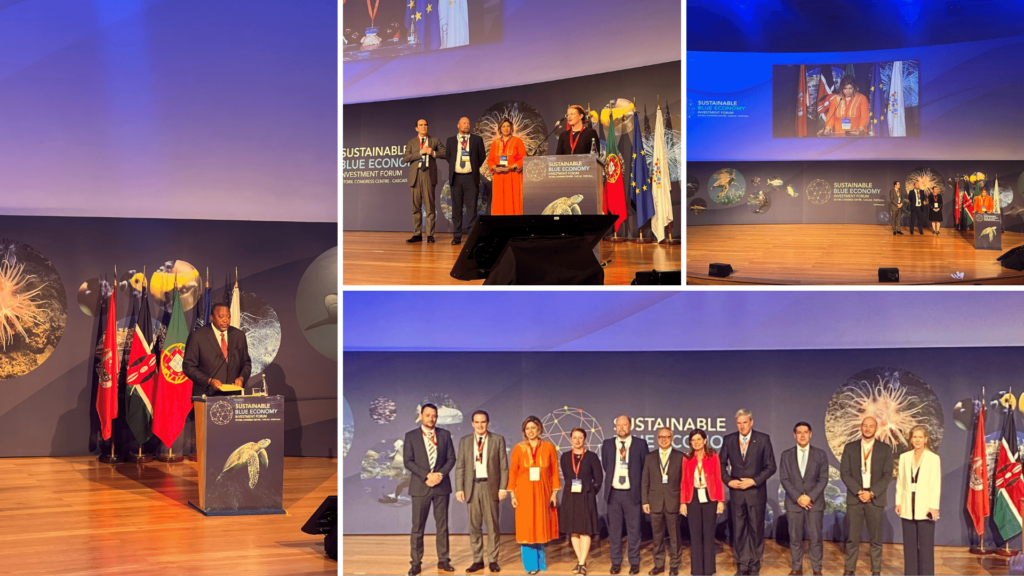
As a special event of the UN Ocean Conference, the Governments of Portugal and Kenya hosted the Sustainable Blue Economy Investment Forum (SBEIF) in Cascais. The Forum aimed to connect key global stakeholders and accelerate transformative blue economic transition. During the Forum, GFCR was featured in two high-level main-stage segments:
- Following keynote speeches by various Heads of State and dignitaries, Preeti Sinha, the Executive Secretary of the United Nations Capital Development Fund took part in the Circular Economy Investment for Blue Economy Panel. Other panelists included H.E. Dr. Chris Kiptoo , Principal Secretary Ministry of Environment and Forestry, Kenya, and Sabine Roux de Bézieux, President, Fondation de la Mer.
- Following the panel segment, the Forum agenda presented the “Special Session: Showcasing Commitments. GFCR was the first feature in this segment, where the Executive Board Chair, Chuck Cooper, introduced the initiative, followed by Heads of Delegation for Bloomberg Philanthropies and Builders Vision announced their joining of the GFCR Coalition and $18 million USD in new contributions, and with final remarks by the Executive Secretary of the United Nations Capital Development Fund relaying the Fund had reached over $170 million USD mobilised since its launch in late 2020.



This official side-event hosted by the United Nations Capital Development Fund (UNCDF), the United Nations Office of the High Representative for the Least Developed Countries (UNOHRLLS), and the United Nations Department of Economic and Social Affairs (DESA) explored partnerships, ocean science and the various sources of finance needed to accelerate sustainable ocean-based economies and resilience in SIDS, LDCs and LLDCs. The challenges and gaps for investing in blue economy activities in LDCs and SIDS were explored, as well as recommendations on how to increase investment financing flows.

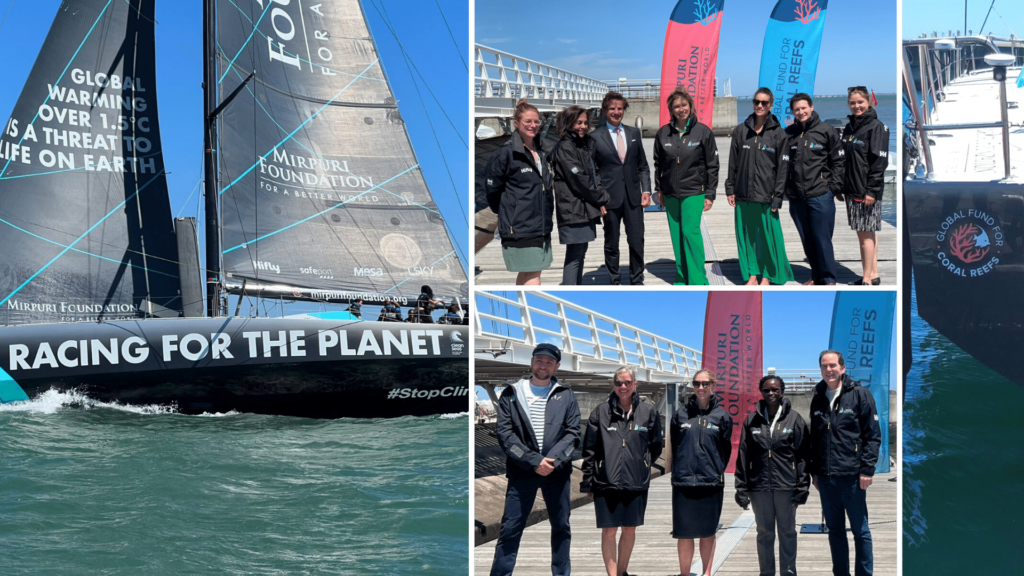
On 29 June, the GFCR climbed aboard the ‘Racing for the Planet’ VO65 racing yacht for a call-to-action voyage series. The series titled ‘Racing Against Reef Extinction’ amplified awareness for the urgent crisis facing coral reefs globally. High-level representatives of the GFCR’s Coalition and network of SDG14 leaders set sail to amplify awareness. Participants included representatives from the German, Kenyan and Australian Government, Bloomberg Philanthropies, Builders Vision, the Paul G. Allen Family Foundation, UNCDF, UNDP, UNEP, the Mirpuri Foundation, and IUCN. The yacht was fitted with GFCR branding and coral reef sails were hoisted for maximum awareness raising.

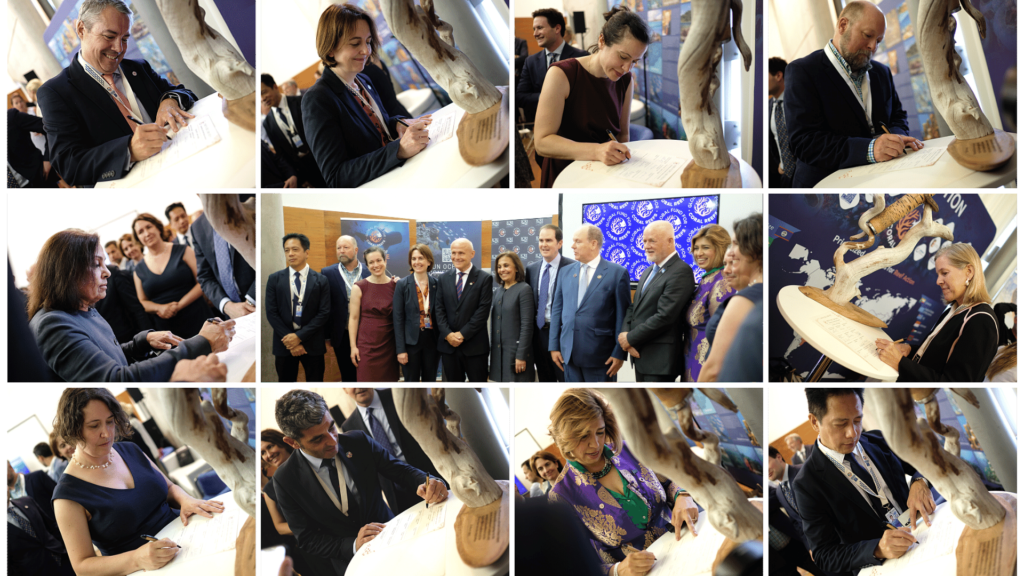
The Prince Albert II of Monaco Foundation and the Paul G. Allen Family Foundation, showcased the robust and expanding coalition of philanthropies, Member States, UN agencies, and private sector impact investors promoting positive change for coral reefs and coastal communities throughout the world. It was also announced that the GFCR received the Environmental Finance Award for ESG Innovation. The event re-emphasized the importance of GFCR as a demonstration Fund, leading the way for greater replication and scalability of reef-positive solutions to secure the future of coral. H.S.H. thanked the partners for their contributions and commitment to facing the crisis, while acknowledging that there is still much work to be done. H.S.H. then gathered partners for the signing of the GFCR Lisbon Declaration: Accelerating Coral Reef-Positive Investment, reiterating and reaffirming their dedication to saving the world’s coral reefs from extinction. With the aim of facilitating greater collaboration and momentum to save coral reefs, among the various pledges, signatories of the Declaration committed to:
- Elevate the need for urgent action to protect coral reefs and associated marine ecosystems within global development, biodiversity, and climate agendas.
- Support efforts to scale-up coral reef positive investments in over 25 priority countries harboring coral reefs.
- Increase efforts to expand the GFCR Coalition by convening additional donors and raising the public-private resource mobilization ambition beyond USD $625 million.
- Support efforts to expand partnerships dedicated to ocean action and promote further collaboration to protect climate-resilient reefs and coastal communities.


Over 90% of investors are interested in the sustainable ocean economy, but there are limited vehicles that can help channel large-scale capital. In this roundtable, one of the best examples of blended finance for the ocean was discussed: the Global Fund for Coral Reefs. The event brought together a diverse set of stakeholders including governments, institutional and impact investors, development finance institutions, donor agencies and climate funds, philanthropies, NGOs, civil society and entrepreneurs. The breakfast session included a deep dive on Indonesia as a demonstration of a strong, investable ocean pipeline and heard from participants on how to streamline transactions to accelerate action.

This side event addressed ways by which scientific and innovative approaches to ocean-based socio-economic development could effectively integrate long standing concepts of coastal management, ocean planning and ecosystem-based management. A ‘Blue Society’ incorporates culture into the pillars of a Blue Economy, involving civil society in socio-economic development because every human being on earth depends on the ocean for survival.
Additionally, this side event focused on scientific, financial and innovative solutions that address the constraints to scaling up ocean action towards the implementation of Goal 14, including through fresh approaches to integrating various development and management frameworks and paradigms as well as relevant initiatives in pursuit of wider SDG impact.

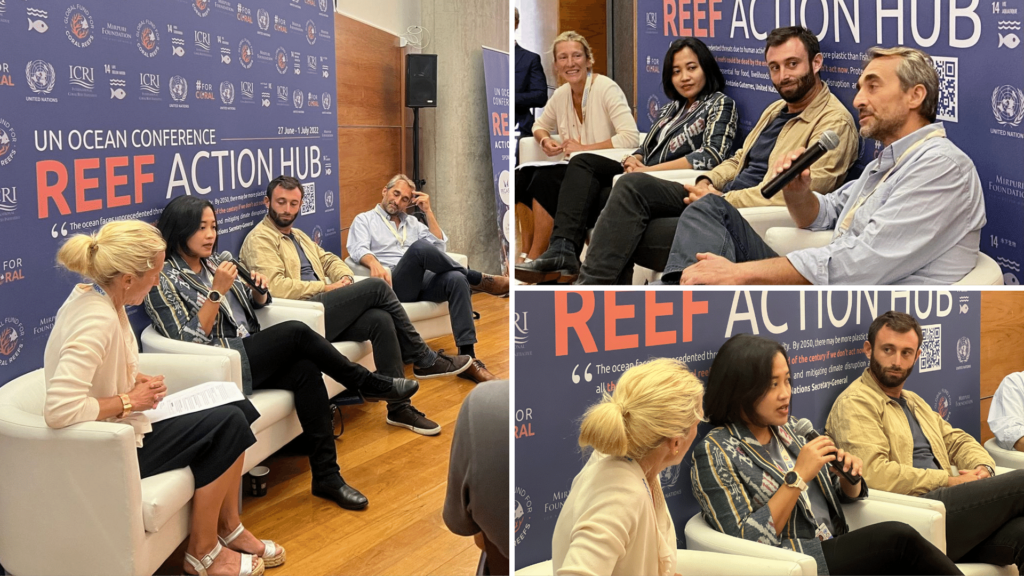
This focused event provided an overview of what makes a business “reef-positive”, followed by a panel of innovators working with support from the Global Fund for Coral Reefs to develop and finance coral reef positive enterprises at a range of scales. This session explored the characteristics of certain business models, including their ability to achieve the Fund’s core “protect-transform-restore-recover” outcomes while producing a return on investment. The event’s panel included some leading innovators in revenue positive coral reef conservation who are actively engaged in the GFCR’s priority ecosystem programmes, including Meizani Irmadhiany, Deputy Senior Vice President, Asia Pacific Field Division and Country Lead for Indonesia at Conservation International; Penny Stock, UNDP Senior Technical Advisor for Ecosystems and Biodiversity: Marine, Coastal and SIDS; Nicolas Pascal, Executive Director of Blue Finance; and Sam Teicher, Co-Founder and Chief Reef Officer of Coral Vita.


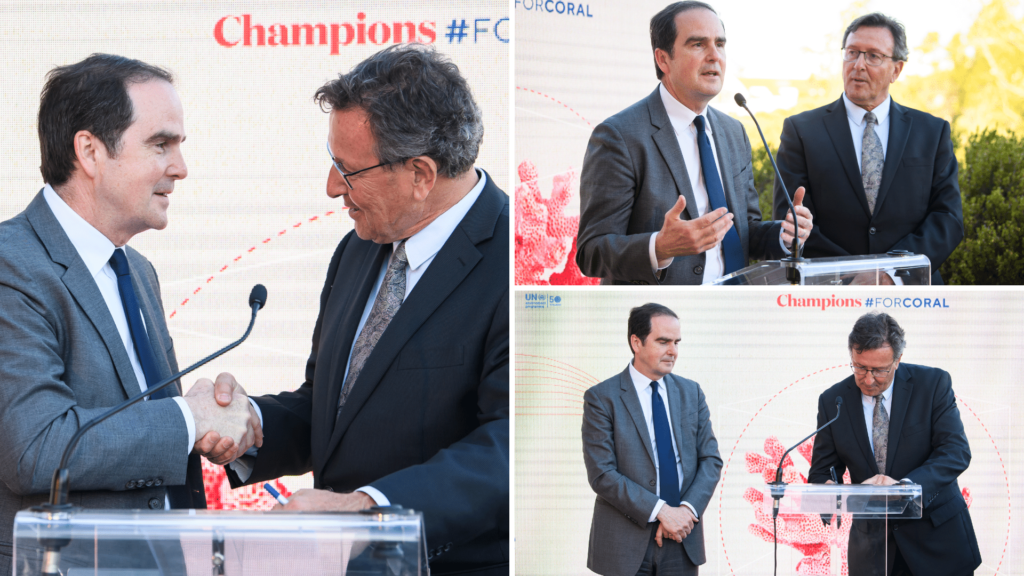
The primary objective of this event was to raise awareness of the critical resource gap facing coral reef ecosystems and foster strategic relationship-building for CORDAP and the GFCR. The event served as a platform to officially launch the new G20 initiative Coral Research & Development Accelerator Platform (CORDAP), and announce its partnership with the Global Fund for Coral Reefs (GFCR).


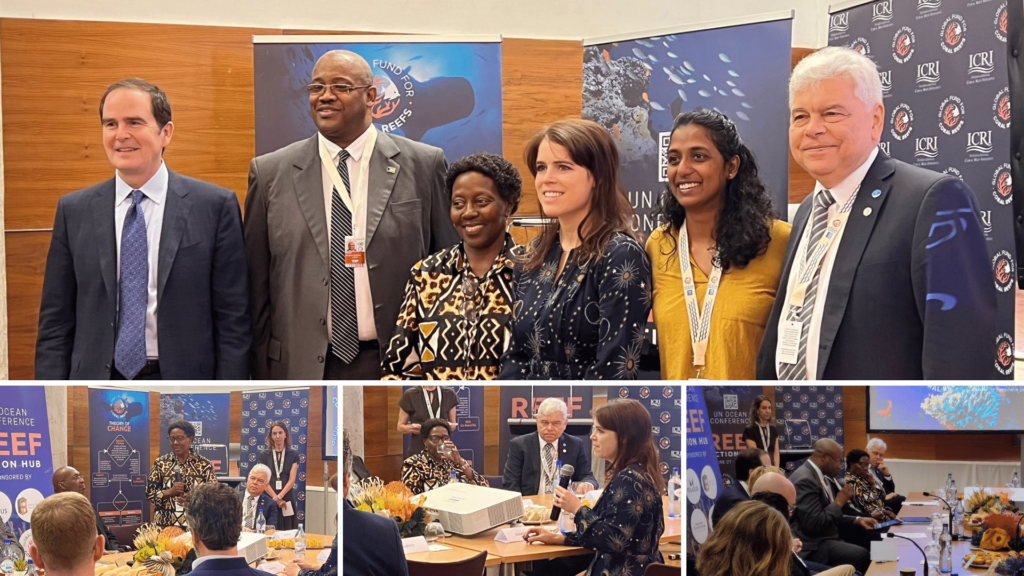
On the final day of the UN Ocean Conference, UNESCO’s Intergovernmental Oceanographic Commission announced the formal recognition of the Global Fund for Coral Reefs as a contribution to the United Nations Decade of Ocean Science for Sustainable Development 2021-2030 (the ‘Ocean Decade’). The announcement was launched as part of a high-level networking breakfast, which featured a panel of SDG-14 leaders and advocates, including Her Royal Highness Princess Eugenie of York; The Honourable Vaughn P. Miller, Minister for the Environment and Natural Resources of The Bahamas; Elizabeth Maruma Mrema Executive Secretary of the Convention on Biological Diversity; Miss Sivajyodee Sannassy Pilly, early career ocean scientist; Dr Vladimir Ryabinin, Executive Secretary of IOC-UNESCO; and Mr. Chuck Cooper, Chair the GFCR Executive Board. showcase the collaboration between the GFCR and the UN Decade of Ocean Science for Sustainable Development. It will also allow participants to take stock of the events of the UN Ocean Conference and spark collaborations and partnerships to advance the post-Lisbon agenda on ocean science and investment in coral reef resilience. will showcase science-based approached to investable coral reef resilience.